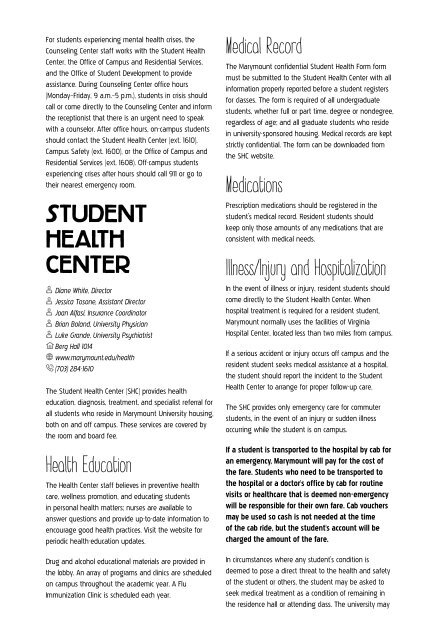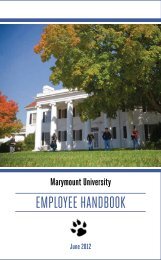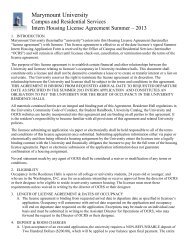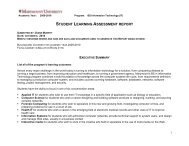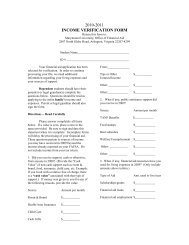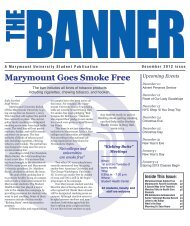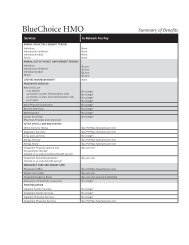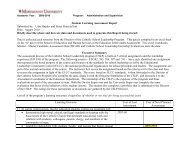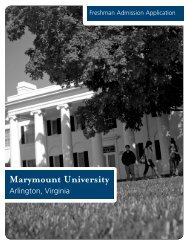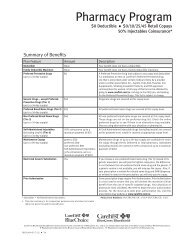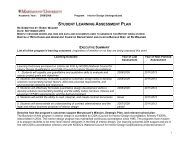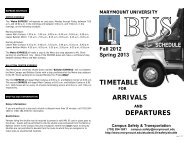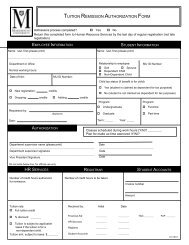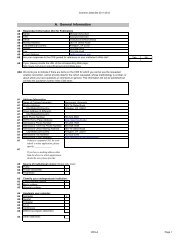Student Handbook - Marymount University
Student Handbook - Marymount University
Student Handbook - Marymount University
You also want an ePaper? Increase the reach of your titles
YUMPU automatically turns print PDFs into web optimized ePapers that Google loves.
For students experiencing mental health crises, the<br />
Counseling Center staff works with the <strong>Student</strong> Health<br />
Center, the Office of Campus and Residential Services,<br />
and the Office of <strong>Student</strong> Development to provide<br />
assistance. During Counseling Center office hours<br />
(Monday–Friday, 9 a.m.–5 p.m.), students in crisis should<br />
call or come directly to the Counseling Center and inform<br />
the receptionist that there is an urgent need to speak<br />
with a counselor. After office hours, on-campus students<br />
should contact the <strong>Student</strong> Health Center (ext. 1610),<br />
Campus Safety (ext. 1600), or the Office of Campus and<br />
Residential Services (ext. 1608). Off-campus students<br />
experiencing crises after hours should call 911 or go to<br />
their nearest emergency room.<br />
<strong>Student</strong><br />
Health<br />
Center<br />
99Diane White, Director<br />
99Jessica Tosone, Assistant Director<br />
99Joan Alfasi, Insurance Coordinator<br />
99Brian Boland, <strong>University</strong> Physician<br />
99Luke Grande, <strong>University</strong> Psychiatrist<br />
]Berg ] Hall 1014<br />
YYwww.marymount.edu/health<br />
[(703) [ 284-1610<br />
The <strong>Student</strong> Health Center (SHC) provides health<br />
education, diagnosis, treatment, and specialist referral for<br />
all students who reside in <strong>Marymount</strong> <strong>University</strong> housing,<br />
both on and off campus. These services are covered by<br />
the room and board fee.<br />
Health Education<br />
The Health Center staff believes in preventive health<br />
care, wellness promotion, and educating students<br />
in personal health matters; nurses are available to<br />
answer questions and provide up-to-date information to<br />
encourage good health practices. Visit the website for<br />
periodic health-education updates.<br />
Drug and alcohol educational materials are provided in<br />
the lobby. An array of programs and clinics are scheduled<br />
on campus throughout the academic year. A Flu<br />
Immunization Clinic is scheduled each year.<br />
Medical Record<br />
The <strong>Marymount</strong> confidential <strong>Student</strong> Health Form form<br />
must be submitted to the <strong>Student</strong> Health Center with all<br />
information properly reported before a student registers<br />
for classes. The form is required of all undergraduate<br />
students, whether full or part time, degree or nondegree,<br />
regardless of age; and all graduate students who reside<br />
in university-sponsored housing. Medical records are kept<br />
strictly confidential. The form can be downloaded from<br />
the SHC website.<br />
Medications<br />
Prescription medications should be registered in the<br />
student’s medical record. Resident students should<br />
keep only those amounts of any medications that are<br />
consistent with medical needs.<br />
Illness/Injury and Hospitalization<br />
In the event of illness or injury, resident students should<br />
come directly to the <strong>Student</strong> Health Center. When<br />
hospital treatment is required for a resident student,<br />
<strong>Marymount</strong> normally uses the facilities of Virginia<br />
Hospital Center, located less than two miles from campus.<br />
If a serious accident or injury occurs off campus and the<br />
resident student seeks medical assistance at a hospital,<br />
the student should report the incident to the <strong>Student</strong><br />
Health Center to arrange for proper follow-up care.<br />
The SHC provides only emergency care for commuter<br />
students, in the event of an injury or sudden illness<br />
occurring while the student is on campus.<br />
If a student is transported to the hospital by cab for<br />
an emergency, <strong>Marymount</strong> will pay for the cost of<br />
the fare. <strong>Student</strong>s who need to be transported to<br />
the hospital or a doctor's office by cab for routine<br />
visits or healthcare that is deemed non-emergency<br />
will be responsible for their own fare. Cab vouchers<br />
may be used so cash is not needed at the time<br />
of the cab ride, but the student's account will be<br />
charged the amount of the fare.<br />
In circumstances where any student’s condition is<br />
deemed to pose a direct threat to the health and safety<br />
of the student or others, the student may be asked to<br />
seek medical treatment as a condition of remaining in<br />
the residence hall or attending class. The university may


